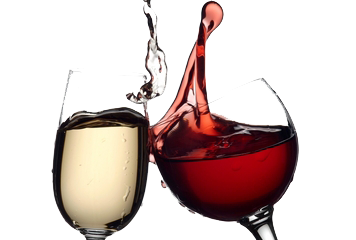Red or White Wine?

Red or White Wine?
Wine' s beneficial effect – without excesses in consumption – in health is now scientifically indisputable. However, there are many that wonder which wine is more preferable to consume: “Red or White”?
Red Wine:
It provides high antioxidant protection: the high content of antioxidants (polyphenol, resveratrol) mainly in red wine, have both anti-inflammatory and anti-cancer properties.
Lipid-lowering, anti-thrombotic actions: Because of the polyphenol contained in wine, levels of HDL cholesterol (good) are raising, while LDL cholesterol (bad) decreases, thereby reducing the risk of atherogenesis creation.
Memory and cognitive perception improvement: Through resveratrol, the anti-oxidising substance that it contains, wine, can offer protection in the brain' s neurons.
Regarding the relationship between red wine consumption and Alzheimer' s diseases risk, it has been found in epidemiological studies, that moderate consumption of red wine, is associated with a lower risk of contracting this disease.
White Wine:
Cancer prevention: Studies in France had revealed the red wine' s contribution in the protection against cancer, but since 2004 a research from the University of Thessaly, has argued that white wine has the same properties as well. This is due to the fact that red has 12 more antioxidants than white, white' s antioxidants are absorbed faster by the human body.
It protects the heart: Resveratol that is found in the grape's skin is the red wine' s antioxidant substance, which has beneficial effect on the heart' s vessels. That's why until recently, credits were awarded only to the red, since white is made from the grape's juice and not the grape's peel. However, molecular biologist Dipak Das head of a School of the University of Connecticut, USA, study, claimed in 2008, that white is equally beneficial to the heart.
White wine against fat: According to a study's findings that took place in La Trobe University in Melbourne, headed by Dr. Anna Kokavec, a glass of white wine before eating, reduces appetite. Specifically, white wine creates a fullness feeling in the stomach. In contrast, this feeling is transient with red wine.
 So, the answer to the question “What wine should I prefer?”is that there is no winner between the two in terms of nutritional value given that both contribute to maintaining good health levels. However, the benefits or the health risks depend on the intake quantity. Benefits seem to stem from moderate consumption (1-2 glasses a day), while risks are directly related to chronic and excessive intake. The nutritional values per glass (red or white) are:
So, the answer to the question “What wine should I prefer?”is that there is no winner between the two in terms of nutritional value given that both contribute to maintaining good health levels. However, the benefits or the health risks depend on the intake quantity. Benefits seem to stem from moderate consumption (1-2 glasses a day), while risks are directly related to chronic and excessive intake. The nutritional values per glass (red or white) are:
Calories: 79
Carbs:3,3 g
Protein: 0,2 g
Fat: 0 g
Ethyl Alcohol: 9,6 g
Source: www.logodiatrofis.gr